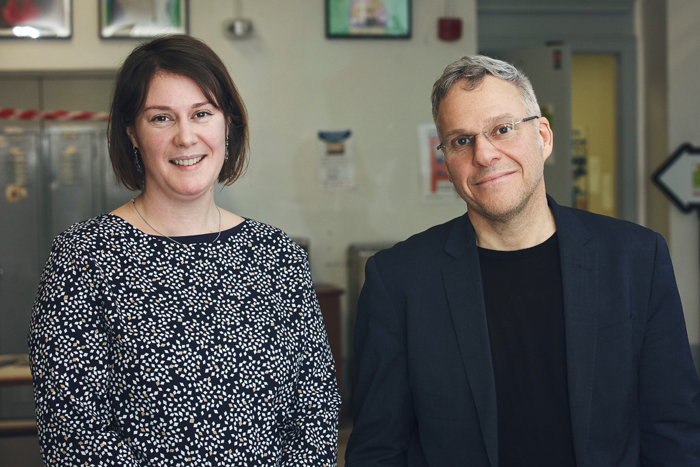Generate many forms of support for vulnerable youth enrolled in adult general education.
Related pages
- A partnership to promote early childhood literacy
- Filling bellies to keep kids in school
- Literacy project creates magical moments for students
- Strong communities working to keep girls in school
- Understanding youth to smooth their transition to high school
- When schools and the business sector work together, youth benefit
- Words that resonate for a school and its community
A project for 16–20-year-olds from Intégration Jeunesse du Québec at Centre Gédéon-Ouimet
Located in Montreal’s Ville-Marie borough, centre Gédéon-Ouimet is an adult education centre attended by about 500 students every year. It offers high school continuation or completion programs, and pre-requisite courses for vocational programs or CEGEP through formal instruction and a personalized approach. Experienced staff support and guide students throughout the significant challenge of re-engaging with school.
It was in this spirit of supporting students that, 14 years ago, the centre asked Intégration Jeunesse du Québec (IJQ) to assist its teachers and professionals in their day-to-day work with students dealing with significant psychosocial issues. Founded in 1980 in Montreal, the IJQ is a non-profit organization dedicated to helping unemployed young adults integrate into society by offering services that focus on both their needs and job market requirements.
The partnership between the IJQ and Centre Gédéon-Ouimet has generated many initiatives over the years, including the aptly named Projet 16-20, aimed specifically at supporting 16–20-year-olds.
Élodie Boisseau and Stéphane Richard (Photo : François Couture)
A partnership that generates many forms of support for vulnerable youth
The adult education student body has become much younger in recent years, hence the idea of designing a program especially for younger students. Sixteen is the age when school attendance is no longer mandatory and when many young people struggling with issues such as poverty, a romantic breakup, identity crisis, an unwanted pregnancy, or drug addiction decide to drop out of school.
“These students also need a ton of psychological and emotional support because their lives are so troubled. But as principal, I can’t afford to pay staff to provide this service internally with our tight budgets. That’s where the IJQ comes in.”
“The adult education format, which includes a more personalized teaching approach and a variable schedule, is better suited to these youth, who still want to go to school despite their troubled lives,” explains Centre Gédéon-Ouimet principal Stéphane Richard. “Our teachers provide guidance, but these students also need a ton of psychological and emotional support because their lives are so troubled. But as principal, I can’t afford to pay staff to provide this service internally with our tight budgets. That’s where the IJQ comes in. They have designed services to meet the needs of these students. For me, it’s a natural partnership because our missions are perfectly aligned.”
Psychosocial intervention during soccer games
As part of Projet 16-20, the IJQ oversees a plethora of extracurricular activities and services for youth at the centre, such as greening workshops, psychological counselling, and social and cultural activities. These activities fulfill many needs and provide an opportunity to offer psychosocial support.
“Thanks to our excellent lines of communication with his professors and the centre’s administration we knew that he displayed similar behaviours at school. We used the sports setting to teach him some self-control techniques and help him understand that there were other ways to react to stress or anger.”
Élodie Boisseau, who supervises employment services and training at the IJQ describes this aspect of the partnership between the two organizations: “Four years ago, we founded a soccer team to play in an inter-centre league. During one match, we were able to intervene with a young person who was having trouble controlling his impulsiveness, and thanks to our excellent lines of communication with his professors and the centre’s administration we knew that he displayed similar behaviours at school. We used the sports setting to teach him some self-control techniques and help him understand that there were other ways to react to stress or anger.”
Creating an environment that fosters interest in school
These activities also create a stimulating environment for the hundred or so young participants, give them a chance to build relationships with each other, and boost their sense of belonging to the school and the community. “In September, we learned that some youth had registered in adult education courses because there was a soccer team at Gédéon-Ouimet!” mentions Boisseau. “And something wonderful happened during the school year,” adds Richard; “some street gangs had approached some of the younger students, and the team veterans intervened to warn them and resolve altercations in the cafeteria. We were so proud!” The various activities also serve to introduce participants to the different community services available to them, a not insignificant side benefit given how difficult it can be to effectively reach this segment of the population.
“We can’t be specialists in every field, so we surround ourselves with partners with various specialties, because our young people face a number of barriers to become employable.”
“At Gédéon-Ouimet, our role is to grease the wheels of a big machine aimed at the well-being of young people. But we can’t be specialists in every field, so we surround ourselves with partners with various specialties, because our young people face a number of barriers to become employable. Having a good résumé isn’t enough to get a job; you need good social skills too. In this sense, the IJQ’s Projet 16-20 helps participants a great deal and really sets them up for success,” declares Richard.
_ June 2018
Over the coming months, Montreal Hooked on School will publish a series of articles about various fruitful partnerships between the education sector and community stakeholders promoting youth success.
We asked writer and photographer François Couture to go and meet the people involved in these partnerships and tell their stories.






